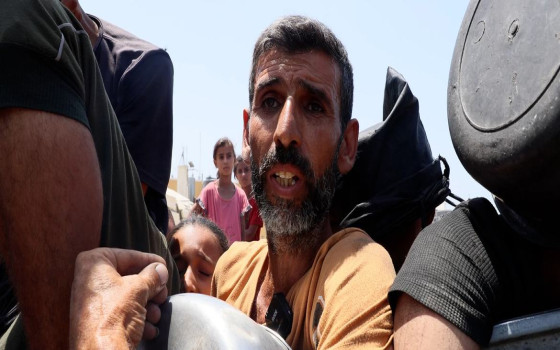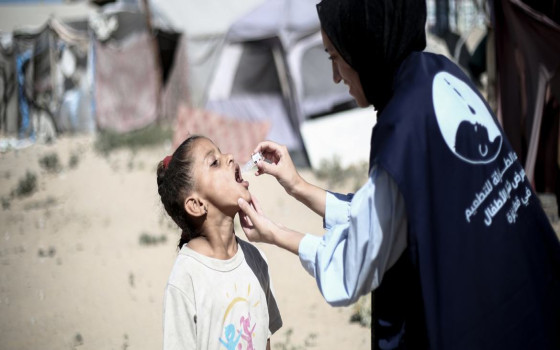UN agencies: The situation in Gaza is beyond catastrophic, and medical teams are being prevented from entering the Strip. Israel called for the abolition of a condition restricting the work of international organizations.

- Europe and Arabs
- Thursday , 7 August 2025 8:46 AM GMT
Gaza - New York: Europe and the Arabs
The United Nations Office for the Coordination of Humanitarian Affairs said that the situation in Gaza is beyond catastrophic, and that more people have been killed and injured, both along aid convoy routes and in their homes.
Farhan Haq, the deputy spokesman for the United Nations, said that hospitals are overstretched, and patients are lying on the ground or in the streets due to a shortage of beds, medical supplies, and equipment. According to the UN daily news bulletin, a copy of which we received Thursday morning, Haq said in his daily press conference that emergency medical teams were denied entry to Gaza yesterday. The World Health Organization stated that more than 100 medical professionals, including surgeons and specialists, have been denied entry to the Strip since March. Commenting on reports that the Israeli authorities had allowed a limited number of commercial trucks to enter, Haq said: "While we continue to follow up to obtain further clarification, initial reports from our partners on the ground indicate that supplies included rice, sugar, and cooking oil. Sugar remains one of the most expensive items on the market. A two-ounce (57-gram) bag of sugar costs approximately $170."
Haq noted that eggs, chicken, and meat have disappeared from the markets, and people are relying on pulses and bread to survive, if available. He said this is not enough to meet the needs of the most vulnerable.
He said the deteriorating market conditions highlight the urgent need for widespread and regular entry of humanitarian aid and commercial goods.
Severe hunger continues to spread in Gaza, and Haq said the Ministry of Health reported the deaths of five people from malnutrition-related causes in the past 24 hours, bringing the total to nearly 200, half of whom are children.
Hunger and malnutrition have devastating effects, including increased risk of disease and death. Meanwhile, limited fuel supplies in Gaza are impacting life-saving operations. Over the past two days, UN staff have brought in approximately 300,000 liters of fuel through the Kerem Shalom crossing, far short of what is needed to sustain humanitarian operations.
UN health partners have warned that the lives of more than 100 newborn babies are at imminent risk due to the fuel shortage. Gasoline has also reached record lows in Gaza, with virtually no supplies entering the Strip for the past 10 days.
Regarding evacuation, the Israeli military renewed two evacuation orders covering approximately 1.5 square miles in five neighborhoods in the Gaza and Khan Younis governorates, while shelter materials have not been allowed into the Strip since March 2.
Farhan Haq said that the few shelter materials available in local markets are extremely expensive and limited, putting them beyond the reach of most families. For their part, UN agencies and non-governmental organizations (NGOs) called on the Israeli authorities to revoke a requirement introduced on March 9 that requires international NGOs to share sensitive personal information about their Palestinian staff, or risk ending their humanitarian operations in the Gaza Strip and the West Bank, including East Jerusalem.
The humanitarian organizations warned that unless urgent action is taken, the majority of NGO partners could have their registration revoked by September 9 or earlier, forcing them to withdraw all international staff and preventing the delivery of vital, life-saving humanitarian assistance to Palestinians.
This requirement is part of a new set of restrictive conditions for NGOs, including potential consequences for publicly criticizing the policies and practices of the Government of Israel, according to a statement issued by the Humanitarian Taskforce in the occupied Palestinian territory.
The statement noted that NGOs not registered under the new system are already prohibited from sending any supplies to Gaza. In July of this year, Israeli authorities rejected repeated requests from 29 NGOs to ship humanitarian aid to Gaza, stating that the organizations were "unauthorized." This policy has already prevented the delivery of life-saving aid, including medicines, food, and hygiene kits. This has a particularly profound impact on women, children, the elderly, and people with disabilities, increasing their risk of abuse and exploitation.
International NGOs also provide crucial support to Palestinian NGOs that rely on international partners for supplies, funding, and technical support. The statement warned that without this cooperation, their operations would be interrupted, depriving more communities of food, medical care, shelter, and vital protection services.
The statement also warned that obstructing NGOs from participating in the collective humanitarian response violates Israel's obligations under international humanitarian law, "and comes at a time when we are receiving daily reports of deaths from extreme hunger as Gaza faces famine conditions."
In a related development, Philippe Lazzarini, Commissioner-General of the United Nations Relief and Works Agency for Palestine Refugees (UNRWA), stressed the need to allow the United Nations and its partners to carry out their work. In a post on X, he said: "Before the famine spread, community distribution centers, supported by partners, provided food and assistance to two million people scattered across the Gaza Strip. After five months of continuous attempts to replace the UN-coordinated response with four Israeli military distribution points, hunger has become the latest killer in Gaza."
Lazzarini said the time has come to deliver aid safely, unhindered, and with dignity.
The Humanitarian Country Team is a strategic decision-making forum, led by the Humanitarian Coordinator for the occupied Palestinian territory. It brings together the heads of UN agencies and more than 200 international and local NGOs, all working in the humanitarian field in the West Bank and Gaza, in accordance with internationally agreed humanitarian principles.














No Comments Found